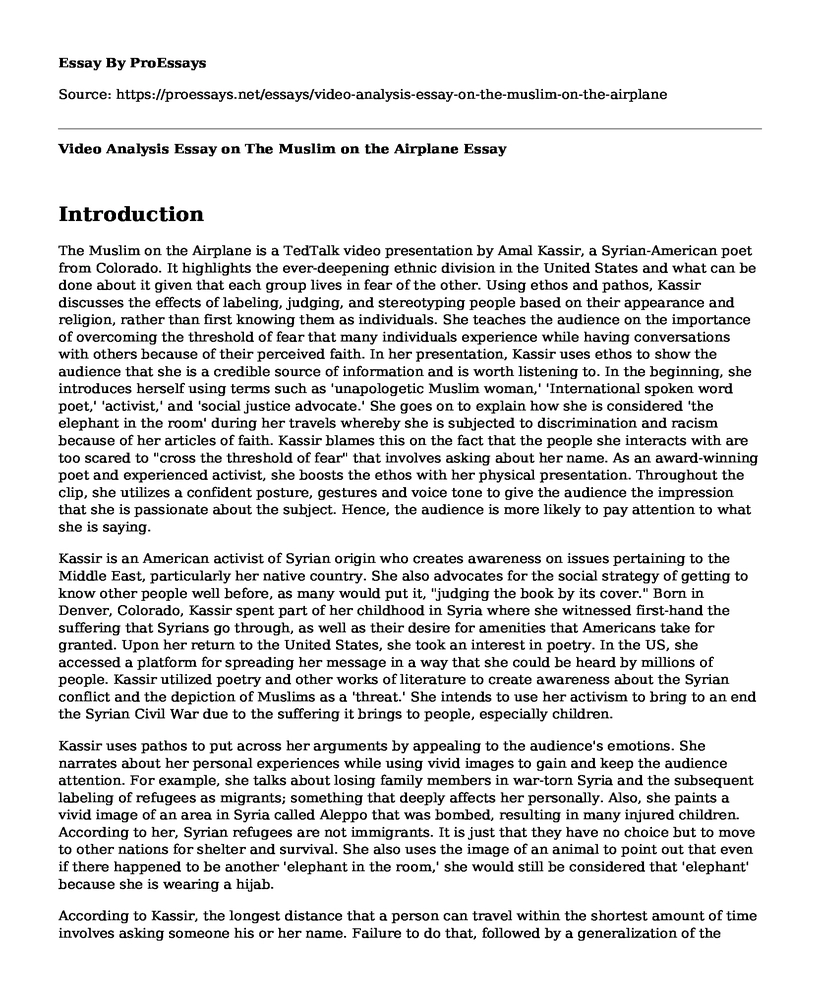Introduction
The Muslim on the Airplane is a TedTalk video presentation by Amal Kassir, a Syrian-American poet from Colorado. It highlights the ever-deepening ethnic division in the United States and what can be done about it given that each group lives in fear of the other. Using ethos and pathos, Kassir discusses the effects of labeling, judging, and stereotyping people based on their appearance and religion, rather than first knowing them as individuals. She teaches the audience on the importance of overcoming the threshold of fear that many individuals experience while having conversations with others because of their perceived faith. In her presentation, Kassir uses ethos to show the audience that she is a credible source of information and is worth listening to. In the beginning, she introduces herself using terms such as 'unapologetic Muslim woman,' 'International spoken word poet,' 'activist,' and 'social justice advocate.' She goes on to explain how she is considered 'the elephant in the room' during her travels whereby she is subjected to discrimination and racism because of her articles of faith. Kassir blames this on the fact that the people she interacts with are too scared to "cross the threshold of fear" that involves asking about her name. As an award-winning poet and experienced activist, she boosts the ethos with her physical presentation. Throughout the clip, she utilizes a confident posture, gestures and voice tone to give the audience the impression that she is passionate about the subject. Hence, the audience is more likely to pay attention to what she is saying.
Kassir is an American activist of Syrian origin who creates awareness on issues pertaining to the Middle East, particularly her native country. She also advocates for the social strategy of getting to know other people well before, as many would put it, "judging the book by its cover." Born in Denver, Colorado, Kassir spent part of her childhood in Syria where she witnessed first-hand the suffering that Syrians go through, as well as their desire for amenities that Americans take for granted. Upon her return to the United States, she took an interest in poetry. In the US, she accessed a platform for spreading her message in a way that she could be heard by millions of people. Kassir utilized poetry and other works of literature to create awareness about the Syrian conflict and the depiction of Muslims as a 'threat.' She intends to use her activism to bring to an end the Syrian Civil War due to the suffering it brings to people, especially children.
Kassir uses pathos to put across her arguments by appealing to the audience's emotions. She narrates about her personal experiences while using vivid images to gain and keep the audience attention. For example, she talks about losing family members in war-torn Syria and the subsequent labeling of refugees as migrants; something that deeply affects her personally. Also, she paints a vivid image of an area in Syria called Aleppo that was bombed, resulting in many injured children. According to her, Syrian refugees are not immigrants. It is just that they have no choice but to move to other nations for shelter and survival. She also uses the image of an animal to point out that even if there happened to be another 'elephant in the room,' she would still be considered that 'elephant' because she is wearing a hijab.
According to Kassir, the longest distance that a person can travel within the shortest amount of time involves asking someone his or her name. Failure to do that, followed by a generalization of the other person based on their appearance, is not asking for his or her story. She explains that people tend to judge others based on their faith and appearance, and then label them without bothering to find out about their circumstances. For instance, refugees are referred to as 'migrants' in a way that implies they attained that status by choice rather than by circumstance. Another offensive label is that of Muslims as 'sand-niggers.' Kassir also highlights a fact is often ignored by many people deliberately. The media sometimes label people on the basis of their ethnicity and skin color. For instance, if a person of Middle Eastern origin commits an act of violence, the media is quick to label them as a terrorist. On the other hand, should a white person commit the same crime, they are labeled as 'mentally ill.' Kassir poses the question: why label the two differently for the same crime?
Conclusion
In The Muslim on the Airplane, Amal Kassir uses various rhetorical devices to enable the audience to connect with her message. Throughout the presentation, she utilizes a casual but formal language as well as humor to ease the sense of superiority between the audience and her. She also makes strong points that people can relate to. Despite not having solid evidence to back up her claims, she succeeds in connecting with the audience and delivering her message.
Works Cited
Kassir, Amal. "The Muslim on the Airplane". YouTube, 14 Dec 2016, https://www.youtube.com/watch?v=UIAm1g_Vgn0&feature=youtu.be
Kusuma, Lyla Anggerwina. "Islamic-Content-TED Public Speaking as a Source Material for Improving Islamic Student's Communication Skill." JEES (Journal of English Educators Society) 2.2 (2017): 75-90.
Cite this page
Video Analysis Essay on The Muslim on the Airplane. (2022, Jul 07). Retrieved from https://proessays.net/essays/video-analysis-essay-on-the-muslim-on-the-airplane
If you are the original author of this essay and no longer wish to have it published on the ProEssays website, please click below to request its removal:
- Why Orca Whales Should Not Live in Captivity Essay
- Comparison of Asian Americans and Latino American Experiences - Paper Example
- Essay Sample on Use of Medication to Treat Alcohol Dependence
- Essay Sample on Substance and Drug Abuse Among Adolescents
- Life Events & Substance Use: Annotated Bibliography
- Audism: Discrimination Against Hearing-Impaired People - Essay Sample
- Female Discrimination in Latin America - Report Example







